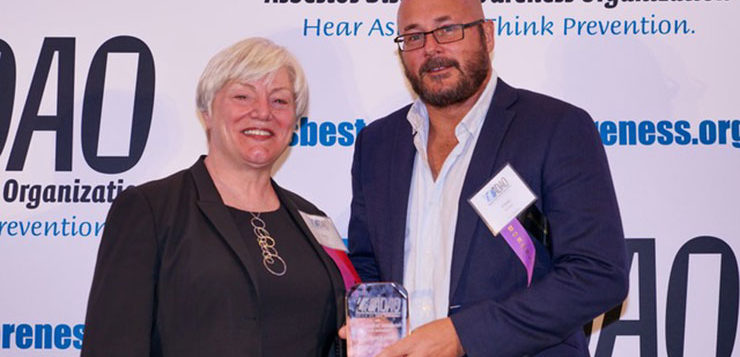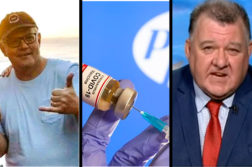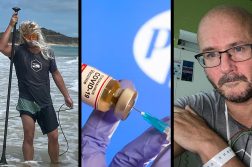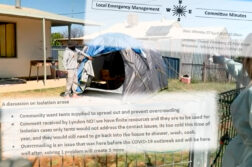Last week, New Matilda editor Chris Graham travelled to the United States, to receive the inaugural Andrew Schneider Memorial Award, launched by the Asbestos Disease Awareness Organisation (ADAO). The award was for an ongoing investigation by New Matilda led by UK Journalist of the Year, Michael Gillard, into an international spy ring established by a Kazahkstan asbestos company to keep tabs on anti-asbestos campaigners around the world, including in Australia. Part III of that investigation is printed in New Matilda today. As part of the award, Graham delivered the first Andrew Schneider Memorial Lecture, a tribute to a journalist who worked tirelessly to expose the lethal affects of asbestos on unsuspecting victims. The lecture was introduced by Andy Schneider’s widow, Kathy Best, also a journalist and the former editor of the Seattle Times. An edited version of the lecture is printed below.
I feel very honoured to be delivering the inaugural Andrew Schneider Memorial Lecture. I didn’t know Andy, but I’ve become familiar with his work, and I had the pleasure of a few drinks with Kathy last night at the bar. Two journalists having a drink is not really news, obviously. It’s not even fake news. It’s kind of what we do. But it was a very enlightening few hours.
In looking at Andy’s work, and in listening to Kathy talk about him, what was very clear is that he was someone who dedicated his life to speaking truth to power. That’s what journalists are supposed to do – we’re supposed to stare down the people who would do our community harm, and ask them difficult questions.
But in an era dominated by ‘fake news’ – and at a time when journalism is in serious decline around the world – there aren’t a lot of good news stories about journalists shining light on bad news stories.
There are exceptions though, and Andy Schneider was clearly one of them. He was a tireless investigator and it’s really no surprise that he came to do so much important reporting on asbestos.
Speaking truth to power is by its very nature a difficult, uncomfortable job, and it can sometimes come at a significant price. In honouring Andy Schneider, and the work of anti-asbestos activists from around the world, that’s what I want to talk about this afternoon – the price.
As Kathy mentioned, I’m the editor and owner of New Matilda, an independent online publication based in Australia. We’re very small – there’s only one full-time staff member for the publication, Gaala Watson, and she’s not a journalist. She looks after the admin side of the business. As for me, I don’t really draw a wage from New Matilda. I do other work to supplement my income.
New Matilda is the publication that opened up the story about Rob Moore, the British documentary film-maker who posed as a journalist, but was in fact spying for a major asbestos company.
I think most people here today would be aware of the details of the story, but for those who aren’t, very briefly, last year New Matilda was leaked a pile of documents that were under a suppression order from the High Court of England & Wales.
The documents revealed an extraordinary trail of deceit by Moore, a man who I think quite a few of you may have met. Indeed he’s a man I think many of you – as activists working to shut down the asbestos industry – would have been targeted by. Barry Castleman is here – I haven’t met Barry yet but I wrote about him last year. Barry Robson, my mate from Down Under and the great Maritime Union of Australia is here – he was also targetted by Moore. Linda, of course, was someone who knew Moore very well. The point being, Moore is someone who infiltrated your community very effectively, and for very bad reasons.
The documents we were leaked revealed that Moore, while posing as a journalist, was in fact spying for a large Kazakhstan-based asbestos company, the Kusto Group. He was contracted by K2 Intelligence, an American firm based in London.
Moore collected intel on the global activities of the anti-asbestos movement for more than a half a decade, reporting back to K2 regularly. He was paid almost half a million pounds for his betrayal.
Moore was eventually outed as a spy in 2016, and he’s spent the last 18 months or so trying to recast himself as a ‘brave whistleblower’ – someone who was working as a double agent to try and expose his dodgy employers.
For the record, Rob Moore was no whistleblower. He was a spy and a traitor who got caught, and has since tried to repair his trashed reputation. It’s a pretty pointless exercise, given the level of his deceit.
Our reporting on Moore – the reporting behind my visit here today – was a two-part feature written with Michael Gillard. I’ll tell you a little more about Michael shortly, because he’s the personification of someone who pays a price for his work. But by way of update, I’m very happy to say that we’re publishing Part 3 of the series on Rob Moore and the Kusto Group tomorrow.
Michael has written another lengthy feature delving into more court documents. I subbed the article last night – it destroys what’s left of Moore’s myth that he was ever really on your side.
What I think is interesting about that story more broadly is the lengths people in power will go to, to suppress the truth and to beat down good people who are trying to shed light on it. People like yourselves – people engaged in campaigns to expose corporations and governments behaving badly. I can tell you from personal experience what that looks like. When New Matilda first published the series of stories in April last year, what followed was a tsunami of legal threats. Linda mentioned her bad-ass attorneys this morning – I want to briefly mention our bad-ass attorneys too. New Matilda survives on the sniff of an oily rag – it is a daily financial struggle to keep the publication going. But we get away with the major investigations we publish in large part because we have a team of excellent lawyers behind us, lawyers who work for nothing. So I want to acknowledge the work of Geoff Holland, our in-house pro bono lawyer. And in particular Michael Bradley and Hannah Marshall and the team at Marque Lawyers, an extraordinary law firm in Sydney, Australia who routinely help us punch well above our weight.
Ironically, New Matilda is probably best known in Australia for getting sued – despite our very small size, we attract an awful lot of lawsuits. We’re kind of famous for it. At the moment, we’re batting 1000 – we haven’t lost a lawsuit yet, although it’s probably only a matter of time before we do. But when we published the Moore series, four separate law firms came after us – one from Australia, representing the Kusto Group, and three from the United Kingdom.
Over the course of a few weeks, we received a barrage of legal letters, and they gradually escalated in their frequency, their tone and their aggression. Ultimately, they included threats that both Michael and I would be dragged into the High Court of England and Wales, to face contempt of court proceedings.
I’m not sure how well people here today know the history of Australia, and our relationship with the United Kingdom, but it’s not all that different from the relationship the United States has. Basically, from our perspective, it’s a middle finger relationship – the notion of the Brits telling an Australian media company that we’re in breach of their laws is ridiculous, and so we treated the threats with the disdain they deserved.
They ultimately went away – if you stare down bullies hard enough, they usually back down. Even bullies representing Big Asbestos.
There is, however, a very long history of big business and government leaning on independent journalists to silence our reporting.
Before I bought New Matilda, I started a newspaper called the National Indigenous Times. That’s actually my area of expertise – I write mostly about the First Peoples of Australia – one of the poorest, most marginalized people on earth. To briefly give you some perspective, Aboriginal Australians in many regions have among the worst life expectancy on earth. For some males, its just 46 years of age, despite the fact they live in a first world country.
Aboriginal people also endure the highest jailing rate on earth – in Western Australia, black males are jailed at rates eight and a half times greater than black males were jailed during the dying days of Apartheid South Africa.
One of the stories I’ve written on over the years is about a group of Aboriginal people in Australia who were employed from the 1940s to the 1970s to work in an asbestos mine on the east coast of Australia. The community that bordered the mine, Baryulgil, had a problem with flooding, so asbestos tailings were routinely dumped at the local school and used to soak up the water, and build playgrounds.
Aboriginal children literally played in the asbestos tailings every day, and were told they were safe, despite the company behind the outrage – James Hardie – knowing for years the risks associated with asbestos.
Aboriginal people in Baryulgil actually used to cook and eat asbestos pancakes when they were low on food. Matt Peacock, who was mentioned earlier this morning, is an Australian journalist who’s done a great deal of work in exposing the story around Baryulgil. The first death from Mesothelioma from the Baryulgil community occurred last year – a man named Ffloyd Laurie. He died the same month that we broke the Rob Moore story.
But I digress I was telling you about the price journalists sometimes pay, which on reflection is a lot smaller than Ffloyd Laurie paid, but I’ll tell you anyway.
In 2004, when I was running the National Indigenous Times, we were leaked a large bundle of federal cabinet documents, which revealed that the Australian Government had lied about why it was abolishing a department set up to help Aboriginal Australians.
As a result of the stories, my home was raided by the Australian Federal Police, our version of the FBI. One morning, in November 2004, five AFP officers turned up on my doorstep with a search warrant. They went through every room and cupboard in my house.
It subsequently emerged that the AFP had launched an entire operation into the National Indigenous Times, called ‘Operation Themis’. Our phones had been tapped, and we’d been placed under physical surveillance. All for a story that had no national security implications whatsoever.
Since then, I genuinely have no idea how many times I’ve been investigated by Australian and state government authorities. My phone records are routinely pulled by police agencies. Sources have occasionally told me that contact with me sparked a phone call from the police.
All journalists these days – at least the ones who don’t follow the official script – are subjected to an ongoing, relentless harassment at the hands of government corporate Australia, and it’s getting worse.
In one day in late 2015, I managed to find myself in two different courts in a single day. New Matilda had broken a major story about the Prime Minister’s daughter receiving a secret educational scholarship worth $60,000, at the same time our government was jacking up the price to go to university.
The person who leaked us the story – a young woman named Freya Newman – was ultimately arrested by police, and charged under an obscure section of the Crimes Act for inappropriately accessing a computer. In November 2015, Freya appeared in the NSW Criminal Court facing a prison sentence of up to seven years. On the same day that she was being sentenced, I was being sued in the Federal Court of Australia for an alleged ‘breach of privacy’ after we published the emails of a University Professor who had been hired by the Australian Government to review the entire Australian school curriculum. His emails revealed that he was deeply racist man, so we published them.
That day remains one of the more surreal of my 30-year career – rushing back and forth between two different courts watching a whistleblower stare down a jail sentence, while trying to defend my publication from a lawsuit that could have potentially run to more than a million dollars in expenses.
Of course, the price I’ve paid is quite small when you think about it. Also, I’m just one half of the team from New Matilda that brought you the story about Rob Moore. Indeed, I’m the lesser half. The other journalist who worked on the story – I mentioned him earlier – is Michael Gillard. Michael couldn’t make it to Washington – he’s been on assignment in some far flung part of the world – I can’t tell you where, because we haven’t published the feature yet, but I can tell you that we’ve already spent the very generous prize money from ADAO to get Michael there.
I can also tell you that it’s a major expose on British Petroleum. They don’t have an interest in asbestos – at least none that I’m aware of – but they are a large, multinational corporation that behaves in precisely the same way as the large asbestos companies – that is with a complete disregard for the safety and lives of their workers and the people who live in and around their communities.
As I mentioned, I’m the lesser half of the team that brought you the Rob Moore story. Most of the work was done by Michael, and his personal story is much more extreme than mine. In 2013 he was named the UK Journalist of the Year – basically the equivalent of your Pulitzers, accept that Michael won the ‘Gold Pulizter’, the most prestigious prize in British journalism.
Like Andy Schneider, he is an extraordinary investigative journalist. He won Journalist of the Year for an investigative series on organized crime in the UK. Not that he turned up to the ceremony to receive his award – He was working on a story in El Salvador about sugar cane workers dying of a chronic kidney disease. Michael looks after his own security but a follow up story on the UK organized crime syndicate earned him an ‘Osman Warning’, which means the police were aware of a credible ‘threat to his life’. Since then, Michael has effectively lived off the grid – and for obvious reasons I can’t go into too much detail, save to say, I never really know where Michael is. He was recently in the jungles of Colombia, where he spent time with the last remaining guerilla force opposing the Colombian government.
Michael lives a ‘pure journalist’ life, a bit like I imagine Andy Schneider did (and by the way, Andy was stabbed during a story investigating the mob… like I said, sometimes you pay a price). As Kathy can probably attest, journalism is more a lifestyle than a career.
All of this, of course, pales into comparison when you compare it to the price that others have paid. But I’ll come back to that in a minute.
I should acknowledge, I came to the Rob Moore story pretty cold. As an Australian, from a country which has a complete ban on asbestos, but a very long history of using it, I had just assumed that asbestos was banned around the world. The notion that it isn’t – that developing countries still allow this poison to be unleashed on their citizens – was quite shocking to me.
It seems inconceivable to me that 250,000 deaths – as one speaker outlined earlier – could be caused annually by asbestos, and yet governments stand by and not only do nothing, but run interference for asbestos companies. As Dr Flores noted earlier, I think that might have something to do with money and politics.
I’ve been staggered to learn that countries like Canada have dragged their heels on asbestos. It’s shocking to me that asbestos can be included in children’s make-up.
What also shocked me is that asbestos companies essentially operate the same way Big Tobacco does – they seek to reduce and diminish the damage that their product does, and they’ll do that by any means necessary, including spending huge quantities of money on corporate spies. Although I imagine that’s far from the worst crimes that companies like the Kusto Group have committed.
One of the things this conference has made very clear to me, is that while journalists do sometimes pay a price for their work, it’s nothing compared to the price people exposed to the asbestos industry have paid.
The work of journalists is obviously very important – we’re called the fourth estate because we represent the fourth pillar of democracy. We’re supposed to be the failsafe when the other pillars of democracy – the law, the parliament and the executive – fail.
On issues like asbestos, that clearly happens regularly. Powerful vested interests lobby your elected representatives to help ensure that they can keep peddling their poison. The Kusto Group is a classic example of that.
But the work of journalists like Andy Schneider, and Michael Gillard, can only happen off the back of committed, hard-working and fearless activists – folks like yourselves who fight to shine light in very dark places.
Listening to the stories here today – and reading the obituaries in the conference program of the ‘Meso Warriors’ – has been very impacting. I loved the tributes at the back of the program – it wasn’t something I was expecting, it’s not something you see at an ‘average’ conference. But I think it does speak volumes about your fight, and about what’s really at stake.
Bad things happen when good people stay silent. Andy Schneider was clearly a very good man, who refused to stay silent. But I’m sure he would want me to acknowledge that there are many more very good people here today, fighting to ensure that the asbestos industry is exposed for its greed and its deceit and its complete indifference to the suffering it has created simply to make a buck.
And so to the good people here today – people like Linda and her crew from ADAO, and the speakers we’ve heard so far, who fight so hard to honour the people they’ve loved and lost, and to expose the corporations and the individuals who are ultimately responsible for those deaths – to those people I say thank you for service, for your courage and for your determination.
No matter what we all do, bad things are still going to happen – that’s an unfortunate fact of life. Deaths in countries like Australia that have already banned asbestos have not yet peaked. Let alone deaths in countries where asbestos is still being rolled out.
But like Andy Schneider, you people have not stayed silent. Your battle has been for your loved ones who you’ve lost, but it’s also been for people around the world in developing countries, and even developed countries, who don’t have a voice, who don’t have the money to hire spies and bribe politicians.
You’ve fought so that people don’t go through what you went through. And along the way you’ve lost many people close to you. But ultimately – in the long run your fight will save many, many more lives. That is an extraordinary legacy to leave.
It also makes tough jobs like mine a lot easier. So if you keep fighting, we’ll keep writing.
Thank you.
Donate To New Matilda
New Matilda is a small, independent media outlet. We survive through reader contributions, and never losing a lawsuit. If you got something from this article, giving something back helps us to continue speaking truth to power. Every little bit counts.




